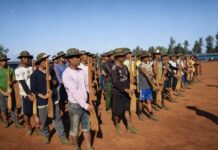Day Two . Monday, 16 March 2015
The 7th UPWC-NCCT meeting is supposed to begin today. However, last minute change of plans: the decision by the President and military chief to meet visiting Kachin Independence Organization/Army (KIO/KIA) in Naypyitaw had postponed it to tomorrow.
Which leaves me the opportunity to visit the Rangoon branch of the PI office.
There my colleagues tell me the current mainstream attitude toward the peace process. “Many think it is just a side issue that is hampering the democratic reform, particularly the upcoming elections,” says one.
Which reminds me of a similar issue following the 1990 elections. The mainstream thought the situation called for Democracy First, while the ethnic parties said their Right of Self Determination came first, because Burma’s post-independence democracy was shattered by the military’s overriding concern about constitutional amendment campaign by the non-Burmans.
The result was a compromised position, as found in the now-defunct United Nationalities League for Democracy (UNLD) statement which was promulgated on 5 May 1997. The gist of it was that Democracy and the Right of Self Determination were inseparable as the head and tail of the coin: the Union.
It seems to me that the same goes for the present democratic reform vs peace process issue. Each complements the other, not negating each other.
I later attend a Chin seminar on the present political situation at Café 47 on Prome/Pyay Road. Moderated by well known Chin lady Chin Chin, the panelists include noted scholar Dr Salai Tun Than, 87; Zo Zam of Chin National Party and Dr Sui Khar of Chin National Front.
One of the questions posed by the audience is why most of the armed groups had not co-signed the 12 February Deed of Commitment (DOC) which promises Federalism, drafting of Framework for Political Dialogue (FPD) and inauguration of Political Dialogue (PD) before the elections by the President and the Union Assembly Speaker themselves, among others.

CNF Representative Dr Sui Khar’s response is as follows:
- The DOC is the result of the 6 month long deadlock between the UPWC and the NCCT. Many were worried the peace process was at a dead end if something wasn’t done
- Actually it was first proposed by the United Nationalities Federal Council (UNFC) and later by the Karen National Union (KNU) and Restoration Council of Shan State (RCSS). The final draft was proposed by the UPWC.
- However toward the Union Day, nothing concrete came out. Most of the armed groups therefore were not prepared to sign, having no mandate from their own organizations
- Of course, those who have been always suspicious of the government’s motives thought that the DOC was proposed because it wanted to avoid the NCA
- Also there are others who think that if the NCA is completed and signed, the DOC is unnecessary
- Personally he thinks if the NCA negotiations get nowhere, the signing of the DOC would be re-considered by several if not all armed groups
The day ends with a meeting with Relief International (RI) representative Joseph Mariampillai who offers to run a health program along the border.
Before we part, he says, “I’ve heard the President saying he is for ‘corporate federalism’. I’m not sure what he means.”
Well, I have no answer for that either. But I’m sure our people at the PI can find out the answer for all of us.











Leave a Comments